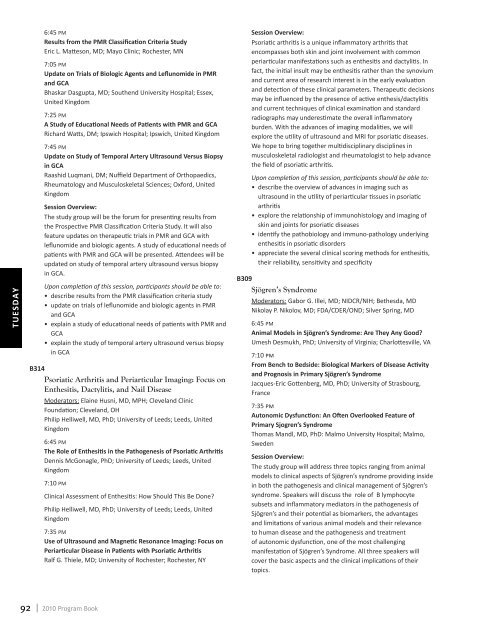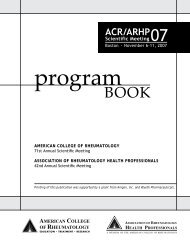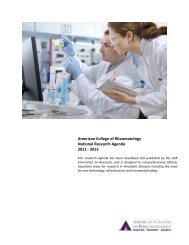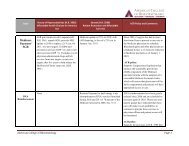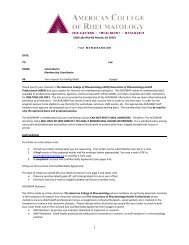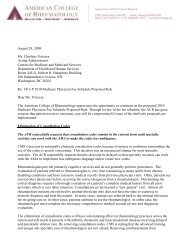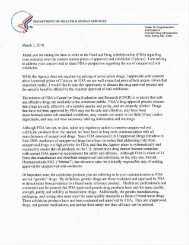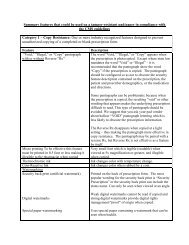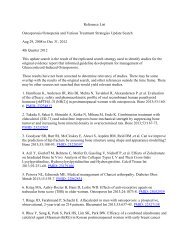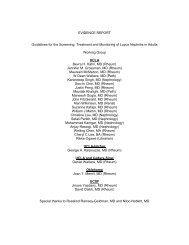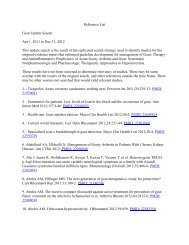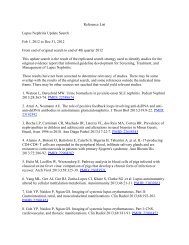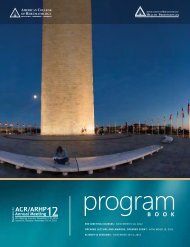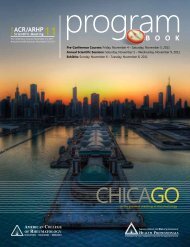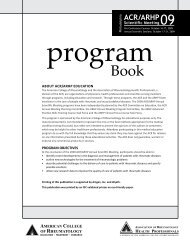B O O K - American College of Rheumatology
B O O K - American College of Rheumatology
B O O K - American College of Rheumatology
Create successful ePaper yourself
Turn your PDF publications into a flip-book with our unique Google optimized e-Paper software.
tuesday<br />
6:45 PM<br />
Results from the PMR Classification Criteria Study<br />
Eric L. Matteson, MD; Mayo Clinic; Rochester, MN<br />
7:05 PM<br />
Update on Trials <strong>of</strong> Biologic Agents and Leflunomide in PMR<br />
and GCA<br />
Bhaskar Dasgupta, MD; Southend University Hospital; Essex,<br />
United Kingdom<br />
7:25 PM<br />
A Study <strong>of</strong> Educational Needs <strong>of</strong> Patients with PMR and GCA<br />
Richard Watts, DM; Ipswich Hospital; Ipswich, United Kingdom<br />
7:45 PM<br />
Update on Study <strong>of</strong> Temporal Artery Ultrasound Versus Biopsy<br />
in GCA<br />
Raashid Luqmani, DM; Nuffield Department <strong>of</strong> Orthopaedics,<br />
<strong>Rheumatology</strong> and Musculoskeletal Sciences; Oxford, United<br />
Kingdom<br />
Session Overview:<br />
The study group will be the forum for presenting results from<br />
the Prospective PMR Classification Criteria Study. It will also<br />
feature updates on therapeutic trials in PMR and GCA with<br />
leflunomide and biologic agents. A study <strong>of</strong> educational needs <strong>of</strong><br />
patients with PMR and GCA will be presented. Attendees will be<br />
updated on study <strong>of</strong> temporal artery ultrasound versus biopsy<br />
in GCA.<br />
Upon completion <strong>of</strong> this session, participants should be able to:<br />
• describe results from the PMR classification criteria study<br />
• update on trials <strong>of</strong> leflunomide and biologic agents in PMR<br />
and GCA<br />
• explain a study <strong>of</strong> educational needs <strong>of</strong> patients with PMR and<br />
GCA<br />
• explain the study <strong>of</strong> temporal artery ultrasound versus biopsy<br />
in GCA<br />
B314<br />
Psoriatic Arthritis and Periarticular Imaging: Focus on<br />
Enthesitis, Dactylitis, and Nail Disease<br />
Moderators: Elaine Husni, MD, MPH; Cleveland Clinic<br />
Foundation; Cleveland, OH<br />
Philip Helliwell, MD, PhD; University <strong>of</strong> Leeds; Leeds, United<br />
Kingdom<br />
6:45 PM<br />
The Role <strong>of</strong> Enthesitis in the Pathogenesis <strong>of</strong> Psoriatic Arthritis<br />
Dennis McGonagle, PhD; University <strong>of</strong> Leeds; Leeds, United<br />
Kingdom<br />
7:10 PM<br />
Clinical Assessment <strong>of</strong> Enthesitis: How Should This Be Done?<br />
Philip Helliwell, MD, PhD; University <strong>of</strong> Leeds; Leeds, United<br />
Kingdom<br />
7:35 PM<br />
Use <strong>of</strong> Ultrasound and Magnetic Resonance Imaging: Focus on<br />
Periarticular Disease in Patients with Psoriatic Arthritis<br />
Ralf G. Thiele, MD; University <strong>of</strong> Rochester; Rochester, NY<br />
Session Overview:<br />
Psoriatic arthritis is a unique inflammatory arthritis that<br />
encompasses both skin and joint involvement with common<br />
periarticular manifestations such as enthesitis and dactylitis. In<br />
fact, the initial insult may be enthesitis rather than the synovium<br />
and current area <strong>of</strong> research interest is in the early evaluation<br />
and detection <strong>of</strong> these clinical parameters. Therapeutic decisions<br />
may be influenced by the presence <strong>of</strong> active enthesis/dactylitis<br />
and current techniques <strong>of</strong> clinical examination and standard<br />
radiographs may underestimate the overall inflammatory<br />
burden. With the advances <strong>of</strong> imaging modalities, we will<br />
explore the utility <strong>of</strong> ultrasound and MRI for psoriatic diseases.<br />
We hope to bring together multidisciplinary disciplines in<br />
musculoskeletal radiologist and rheumatologist to help advance<br />
the field <strong>of</strong> psoriatic arthritis.<br />
Upon completion <strong>of</strong> this session, participants should be able to:<br />
• describe the overview <strong>of</strong> advances in imaging such as<br />
ultrasound in the utility <strong>of</strong> periarticular tissues in psoriatic<br />
arthritis<br />
• explore the relationship <strong>of</strong> immunohistology and imaging <strong>of</strong><br />
skin and joints for psoriatic diseases<br />
• identify the pathobiology and immuno-pathology underlying<br />
enthesitis in psoriatic disorders<br />
• appreciate the several clinical scoring methods for enthesitis,<br />
their reliability, sensitivity and specificity<br />
B309<br />
Sjögren’s Syndrome<br />
Moderators: Gabor G. Illei, MD; NIDCR/NIH; Bethesda, MD<br />
Nikolay P. Nikolov, MD; FDA/CDER/OND; Silver Spring, MD<br />
6:45 PM<br />
Animal Models in Sjögren’s Syndrome: Are They Any Good?<br />
Umesh Desmukh, PhD; University <strong>of</strong> Virginia; Charlottesville, VA<br />
7:10 pm<br />
From Bench to Bedside: Biological Markers <strong>of</strong> Disease Activity<br />
and Prognosis in Primary Sjögren’s Syndrome<br />
Jacques-Eric Gottenberg, MD, PhD; University <strong>of</strong> Strasbourg,<br />
France<br />
7:35 pm<br />
Autonomic Dysfunction: An Often Overlooked Feature <strong>of</strong><br />
Primary Sjogren’s Syndrome<br />
Thomas Mandl, MD, PhD: Malmo University Hospital; Malmo,<br />
Sweden<br />
Session Overview:<br />
The study group will address three topics ranging from animal<br />
models to clinical aspects <strong>of</strong> Sjögren’s syndrome providing inside<br />
in both the pathogenesis and clinical management <strong>of</strong> Sjögren’s<br />
syndrome. Speakers will discuss the role <strong>of</strong> B lymphocyte<br />
subsets and inflammatory mediators in the pathogenesis <strong>of</strong><br />
Sjögren’s and their potential as biomarkers, the advantages<br />
and limitations <strong>of</strong> various animal models and their relevance<br />
to human disease and the pathogenesis and treatment<br />
<strong>of</strong> autonomic dysfunction, one <strong>of</strong> the most challenging<br />
manifestation <strong>of</strong> Sjögren’s Syndrome. All three speakers will<br />
cover the basic aspects and the clinical implications <strong>of</strong> their<br />
topics.<br />
92<br />
2010 Program Book


